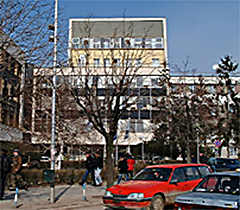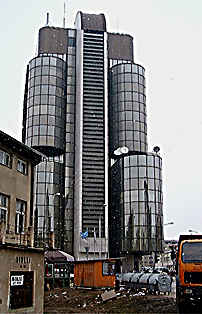Teaching
Peace in Kosovo.
A Report
by
Peter
Jarman
TFF's Conflict-Mitigation
team
Purpose
I was invited with Kerstin Schultz to contribute to
training in conflict management skills of middle level
leaders of the Kosovo Protection Corps, KPC. This
followed the earlier involvement of Jan Oberg of TFF with
a similar training exercise with the top leadership of
the KPC. The three of us are members of TFF's Balkans
mitigation team based in Lund, Sweden, which has made
many missions since 1991 to Kosovo and other regions of
the Balkans.
Background
IOM are responsible for a comprehensive training
programme for the KPC leadership that includes briefings
for example from KFOR, the ICRC, UNMIK, and NGO's working
in the region concerned with rehabilitation and safety.
TFF was invited to contribute some training seminars on
conflict management skills.
Kerstin Schultz and I were invited to give
presentations to six groups of KPC middle level leaders,
about 550 persons altogether in six locations.
The head of the IOM mission in Pristina, Pasquale
Lupoli, advised us that the KPC were drawn from the KLA.
Nearly 14,000 of them asked for employment with the KPC
and 3000 were selected through a test similar to the
British army tests for intelligence, aptitude and
suitability. A senior leadership of about 46 were
selected from these 3000, a medium level leadership of
about 560 were also selected and the remainder were
considered as rank and file. We were led to believe that
this selection was rather arbitrary &endash; IOM appears
only to have rejected outright those that were illiterate
whilst the ex-KLA personnel had influence over those
given seniority.
We asked people from IOM, KFOR, and OSCE about the
role expectations for the KPC - what they might be doing
in a few months time. The response was vague. I asked KPC
groups what they perceived their role to be but their
vision seemed to me to be clouded. I felt that the main
purpose of creating the KPC was to employ ex-fighters in
a civilian protection Corps, giving them a post-war role
rather than inclining them in their idleness towards
trouble making through for example drug trafficking,
kidnapping and crime as was the case with the ex-Chechen
guerrilla fighters.
The TFF training seminars were intended I believe to
begin to change the mentality of the KPC from a fighter
mind-set to one focused on the security and livelihood of
all the peoples of Kosovo. Such an attitude change in
principle requires intensive workshop practice in small
groups over several weeks. There was I felt a very
limited potential in working with large groups for the
first time for only an hour or two. In retrospect I feel
that a substantial but necessarily limited achievement
was effected.

Photo © TFF
UN
HQ in Pristina
My first training seminar was with about 260 of these
KPC middle rank leaders in a cinema in Pristina on March
8. I was not previously advised that I would be expected
to address such a large group in fixed seating
accommodation. A set piece, well-orchestrated
presentation was called for and I did not have adequate
visual material &endash; well prepared overhead
transparencies and slides &endash; to make a good impact
on such a group. The interpreter from a market
organisation was poor and I only had a minute or two
beforehand to brief him. Nevertheless I believe that some
attitudinal change took place amongst the audience who
were very attentive. In asking for questions, I was
surprised that a senior KFOR officer in the front row
asked me to give specific advice for the situations in
which the KPC would be working. Did he have a clearer
perception of this role expectation than IOM or
myself?

Photo © TFF
OSCE's
HQ in Pristina
|
My second training seminar with
about 60 KPC leaders took place in the
basement of a hotel in Prezren on March 9
&endash; the expected accommodation on the
ground floor had been double booked. This
seminar went very well: good attention, keen
and appropriate questions, and several
participants asked me for my seminar notes in
Albanian which alas I did not have. The IOM
interpreters were poor and after about five
minutes a KPC officer offered to interpret
and he did a very good job. Several
participants were professional men: a good
response came from a medical doctor, for
example.
My third seminar was held in a hotel in
Pec on March 10 with about 50 KPC officers.
The room had a very large oval table and we
had to crowd around it. I gave the same
seminar that went down so well in Prezren.
Although the attention was good, the audience
was lifeless when it came to comments and
questions. A break of ten minutes would then
have been welcomed before engaging the group
in some but I was constrained for time as I
had a long and uncertain journey that day to
get to Skopje in time for my return
flight.
|
Content and style
of training seminars
I followed the spirit and intention of the agenda laid
out in the IOM contract (as devised by Jan Oberg for his
previous training seminar). What worked well at the
second meeting was a modification of what did not work
out so well with the very large first group in the
cinema; the same agenda was used for the third
meeting.
1. Brief introduction to myself and my engagement with
post war situations in the Balkans and the Caucasus.
2. Emphasised that the KPC and myself were practising
the same profession of protecting the lives and
livelihoods of civilian populations against violence and
suffering.
3. Violence is any action or structure that reduces or
takes away fundamental human needs. Explored the
hierarchy of human needs beginning with that of food,
warmth, shelter, safe water, reliable utilities and the
disposal of waste. Then we looked at security
arrangements to which the KPC would contribute, and to
societal and personal goals.
4. To reduce suffering and violence requires good
conflict management skills. Without training in listening
skills, conflict perception, negotiation and mediation,
much suffering and violence could result.
5. Introduced concepts of forgiveness, repentance and
reconciliation through the classic Vietnam war photograph
of a Vietnamese girl fleeing from violence and another
photograph of her reconciled many years later with one of
the American airmen who dropped napalm on Vietnam who
asked forgiveness of her and received it.
6. Explored negotiation between people and groups with
equal power. Used cartoon of boy and girl fighting over a
single orange on a tree before recognising that the boy
wanted the juice whilst the girl only wanted the peel for
marmalade.
7. Introduced and discussed the triad of conflict
formations, attitudes/emotions arising from the conflict
&endash; mostly hidden from observation &endash; and the
behaviour that can result from such emotions - that could
be violent leading to a change in the conflict situation,
deeper wounds of feeling and more violent behaviour.
8. Discussed win-lose (zero sum) and win-win
negotiations with examples.
9. Discussed asymmetric unbalanced conflict situation
using conflicts over territory focussing on latent
conflict, conscientization, risks of over conflict as
majority population seeks to realise its basic human
rights through passive resistance (India) or seizing
political control (Nagorno Karabakh). Explored both
non-violent and violent resolutions to such conflicts
emphasising that violent methods leave a lot of hurt to
be addressed.
10. Remarked that ethnic cleansing leads to alienation
and with the help of the media enemy stereotypes are
created that increases the alienation and makes
reconciliation more difficult. To effect changes in
attitudes between such alienated groups requires face to
face trust building meetings that can be facilitated by
third parties. Gave examples from my experience of
initiatives by women and young people who have crossed
hard borders to meet the other side. (Referred to
exercises in which I have accompanied such people across
borders in Eastern Slavonia and the North Caucasus.
11. Hurt gives rise to the negative emotions of anger,
hate, fear and depression.
12. Discussed forgiveness, repentance and
reconciliation between individuals and groups after
violence &endash; how can the hurt be healed? Described
the truth and reconciliation commission in South
Africa.
13. Emphasised that we cannot be imprisoned by the
past, by constantly analysing the hurt of the past and
blaming that on some other party. We should take command
of the present moment here and now to set up realistic
goals for a better future.
14. Invited questions and comments continually.
15. Invited a Buddhist bell of mindfulness to sound in
memory of all the victims of violence. (The second group
sprang to attention at this point!)
Reflections and
suggestions
I appreciate the need to train the KPC in conflict
management skills intrinsic to building a peaceful and
just society in Kosovo. This requires a major shift in
attitudes and behaviour that cannot be effected simply by
seminars to large groups. I recommend as a next step more
intensive small group with the top leadership of the KPC
over a period of several days and involving group
exercises including role-play.
There are some well-trained conflict management
facilitators amongst the civilian population of Pristina
who could conduct some training in Albanian against a
local cultural background. Naturally IOM would be
apprehensive about choosing such Albanian facilitators
that would be acceptable to the KPC but TFF with its long
experience of Kosovo and its connection with Western
NGO's with similar experience could help in vetting
appropriate trainers.
I missed the presence of IOM staff at my seminars in a
support role - on two occasions I only had interpreters
of no great skills. I also missed having flip charts.
I learnt much from this brief mission and would be
pleased to be included in further training missions.
On another occasion it would be good to have some
notes in Albanian about conflict management skills to
give out to participants.
Thanks to the IOM staff in Geneva, Pristina, and
Djakova for their good arrangements and attention to
detail. I was on the whole very well looked after.
Peter Jarman, 15 March 2000.

Tell a friend about this article
Send to:
From:
Message and your name
|